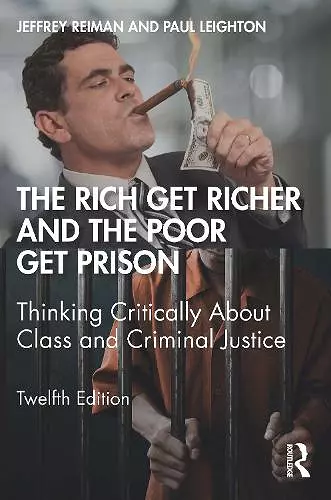The Rich Get Richer and the Poor Get Prison
Thinking Critically About Class and Criminal Justice
Paul Leighton author Jeffrey Reiman author
Format:Paperback
Publisher:Taylor & Francis Ltd
Published:30th Jun '20
Should be back in stock very soon

For 40 years, this classic text has taken the issue of economic inequality seriously and asked: Why are our prisons filled with the poor? Why aren’t the tools of the criminal justice system being used to protect Americans from predatory business practices and to punish well-off people who cause widespread harm?
This new edition continues to engage readers in important exercises of critical thinking: Why has the U.S. relied so heavily on tough crime policies despite evidence of their limited effectiveness, and how much of the decline in crime rates can be attributed to them? Why does the U.S. have such a high crime rate compared to other developed nations, and what could we do about it? Are the morally blameworthy harms of the rich and poor equally translated into criminal laws that protect the public from harms on the streets and harms from the suites? How much class bias is present in the criminal justice system – both when the rich and poor engage in the same act, and when the rich use their leadership of corporations to perpetrate mass victimization?
The Rich Get Richer shows readers that much of what goes on in the criminal justice system violates citizens’ sense of basic fairness. It presents extensive evidence from mainstream data that the criminal justice system does not function in the way it says it does nor in the way that readers believe it should. The authors develop a theoretical perspective from which readers might understand these failures and evaluate them morally—and they to do it in a short text written in plain language.
Readers who are not convinced about the larger theoretical perspective will still have engaged in extensive critical thinking to identify their own taken-for-granted assumptions about crime and criminal justice, as well as uncover the effects of power on social practices. This engagement helps readers develop their own worldview.
New to this edition:
- Presents recent data comparing the harms due to criminal activity with the harms of dangerous—but not criminal—corporate actions
- Updates statistics on crime, victimization, incarceration, wealth, and discrimination
- Increased material for thinking critically about criminal justice and criminology
- Increased discussion of the criminality of middle- and upper-class youth
- Increased coverage of role of criminal justice fines and fees in generating revenue for government, and...
"It is an important text as it presents an impressive body of evidence supporting the authors’ assertion that the justice system fails to "protect us against the gravest threats to life, limb, or possessions" (p. 98). The text emphasizes how, through its actions, the justice system perpetuates bias against the poor and ensures their continued oppression by projecting an inaccurate picture of who and what poses the greatest danger. The authors convincingly argue that failure to seriously reform the justice system stems from benefits it inadvertently provides to those with the power to reform it… The text not only requires students to think deeply about the justice system, it models the importance of evidence at a time when claims are too often believed because they touch a nerve rather than because they have credible support. The authors provide a mountain of evidence that both supports their claims and presents a volume of sources readers cannot easily ignore… Perhaps the authors’ greatest achievement is that The Rich Get Richer and the Poor Get Prison demonstrates how our justice system operates is not inevitable."
Professor Alan S. Bruce, Quinnipiac University
This excerpt was taken from Alan S. Bruce's review of the text in the Journal of Criminal Justice Education. The full review can be found in the supplementary material provided below.
ISBN: 9780367231798
Dimensions: unknown
Weight: 385g
260 pages